Jonathan Dimbleby: How Stalin’s audacious deception humbled the German army
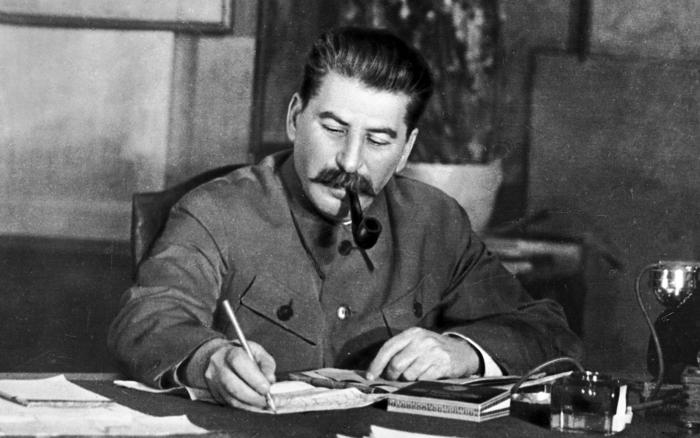
Stalin's Operation Bagration changed history - ullstein bild/ullstein bild via Getty Images
As the clock ticked down to D-Day, Churchill’s apprehension grew. He concealed his forebodings in public with a magnificent display of political chutzpah. And, as though to reassure himself in the process, he sent a cable to Roosevelt that oozed resolution: “I am becoming very hard set upon Overlord . . . I do not agree with the loose talk which has been going on, on both sides of the Atlantic about the undue heavy casualties which we shall sustain. In my view it is the Germans who will suffer very heavy casualties when our band of brothers gets among them.”
But, on the night of June 5, his final words to his wife as she bade him goodnight in the underground map room in Whitehall spoke another truth: “Do you realise that by the time you wake up in the morning, 20,000 young men may have been Killed?” Mercifully, he was overly pessimistic.*
As the Allied troops swarmed ashore on the Normandy coast, the prime minister cabled Stalin. His message was uncharacteristically succinct: ‘Everything has started well. The mines, obstacles and land batteries have been largely overcome. The air landings were very successful and on a large scale. Infantry landings are proceeding rapidly and many tanks and self-propelled guns are already ashore. Weather outlook is moderate to good.’
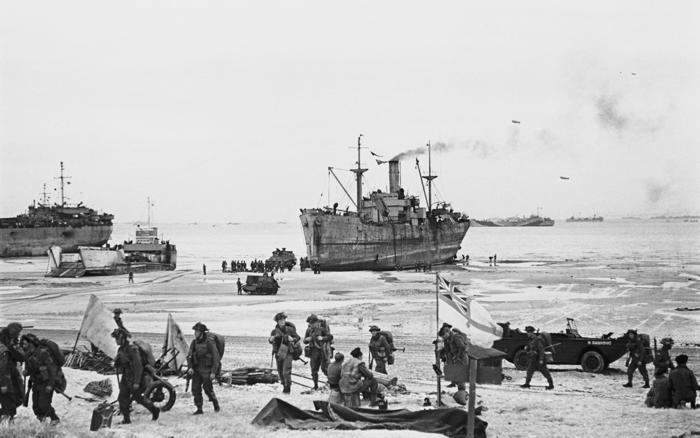
British troops arrive on land on D-Day on 6 June 1944 - Lt. Cdr. Norway/ Imperial War Museums via Getty Images
He had no need to tell him that D-Day was the greatest feat of amphibious warfare ever attempted, or that it was proving to be a spectacular triumph. The day before, after reading a dispatch from the prime minister informing him that the landings were about to take place, Stalin had sneered, “Yes, there will be a landing, if there is no fog. Until now there was always something to put it off.
“I suspect tomorrow it will be something else. Maybe they’ll meet with some Germans! What if they meet with some Germans! Maybe, there won’t be a landing then, but just promises as usual.”
As his interlocutor, the Yugoslav partisan leader Milovan Djilas, observed, the sneer did not so much reflect a genuine doubt as a chance to mock the failure of the Western Allies to honour similar undertakings in the past.
But, with the news that Overlord was finally underway, Stalin became far more gracious, ready to acknowledge that D-Day had been a triumph of meticulous planning, brilliant organisation and dauntless resolve.
He did not trouble to hide his admiration and relief, informing Churchill, “I have received your communication about the successes of the beginning of the Overlord operations. It gives joy to us all and hope of further success.”
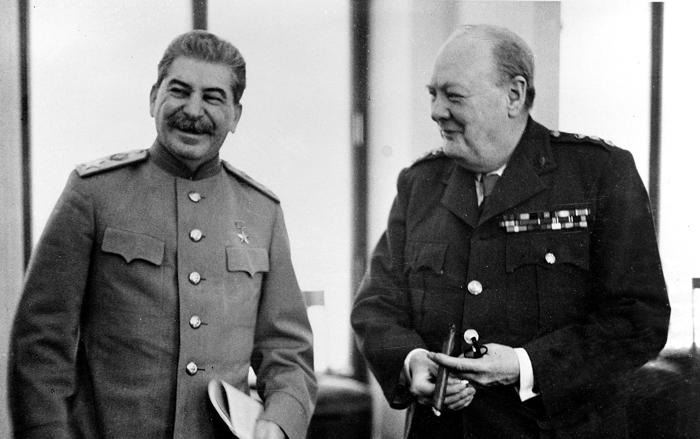
Joseph Stalin (left) with British Prime Minister Winston Churchill at the Yalta conference in the Crimea in 1945, where they were joined by President Roosevelt - Paul Popper/Popperfoto
In the same message, he was unusually forthcoming about his own closely guarded plans [what came to be known as Operation Bagration]:
The Soviet summer offensive, organised in accordance with the agreement at the Tehran Conference, will begin towards the middle of June on one of the most important sectors of the front. The general offensive of the Soviet forces will develop by stages . . . At the end of June and during July offensive operations will become a general offensive of the Soviet forces.
The message inevitably concealed more than it imparted but – for the time being at any rate – it demonstrated that the Big Three were at least in harmony about the greatest joint venture of the war: the strangulation of Nazism.
In Moscow, the Stavka [Soviet high command] had achieved the near-impossible, not by chance but by design. In the space of a few weeks, hundreds of thousands of men and pieces of heavy equipment had been transferred or redeployed over huge distances without alerting German Intelligence to what might be afoot. This had required strategic and operational maskirovka [masking] measures of the most elaborate and sophisticated kind.
Initially, to ensure that no details could leak to the enemy, only four individuals aside from Stalin himself – [senior officers] Zhukov, Vasilevsky, Antonov and Shtemenko – were fully aware of the plans for the summer campaign. All correspondence, telephone conversations and telegraph messages concerning it were strictly forbidden and fiercely policed.
The Stavka had begun to put these measures in place on May 3. The commander of the 3rd Ukrainian Front, Rodion Malinovsky… received the following order:
You are charged with conducting operational maskirovka measures for the purpose of misinforming the enemy. It is necessary to show a concentration of eight to nine rifle divisions, reinforced with tanks and artillery, beyond the right flank of the front . . . The false region of concentration should be animated, showing the movement and disposition of separate groups of men, vehicles, tanks and guns, and the equipping of the region; anti-aircraft guns should be placed at the locations of tank and artillery mock-ups.
To complete the illusion of an imminent offensive, the skies were to be patrolled by Soviet fighters – though not so aggressively as to prevent German spotter planes from photographing the troop concentrations and thereby, as Shtemenko put it, confirming the “plausibility of the false objectives”.
Similar ruses were put in place all along the line. For the commander of the 1st Baltic Front, Bagramyan, maskirovka meant simulating preparations for a major assault on Vitebsk from the north while secretly moving the 6th Guards Army 120 kilometres to the south of the city, a redeployment of 100,000 troops that took three nights to complete.
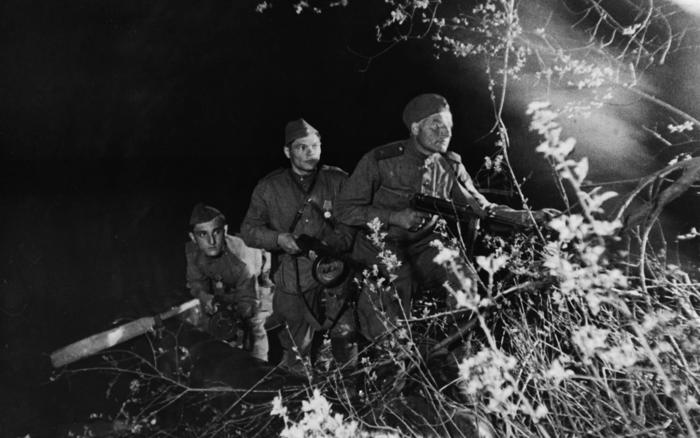
Soviet Red Army soldiers on night reconnaissance on the 1st Baltic Front in June 1944 - Sovfoto/Universal Images Group via Getty Images
[Commander] Rokossovsky ordered his five armies to make sure that “all activities at the front were concealed from the enemy… He was to see only what we wanted him to see… In many places we built fake crossings and roads. Guns were concentrated on secondary lines, from which they launched artillery attacks and were then removed to the rear: dummies being left there on the firing positions.”
At night, 15-man squads carrying torches moved back and forth along the routes between mock assembly areas to simulate the secret movement of vehicles, making sure these were clearly visible to the German pilots circling above them. Meanwhile, the 1st Belorussian Front was reinforced by the 5th Guards Tank Army from the Ukraine, a redeployment that was concealed by the noisy diversion of nine rifle divisions, two artillery divisions and a tank corps, as though they were preparing to advance in an entirely different direction. The maskirovka programme was almost wholly successful in hiding the scale and ferocity of the offensive that was in preparation.
It was a logistical challenge of mind-boggling proportions to transport hundreds of thousands of men, thousands of tanks and artillery, as well as the fuel and supplies required for a huge and sustained offensive, all under cover of darkness over many hundreds of kilometres by train, along often single-track lines.
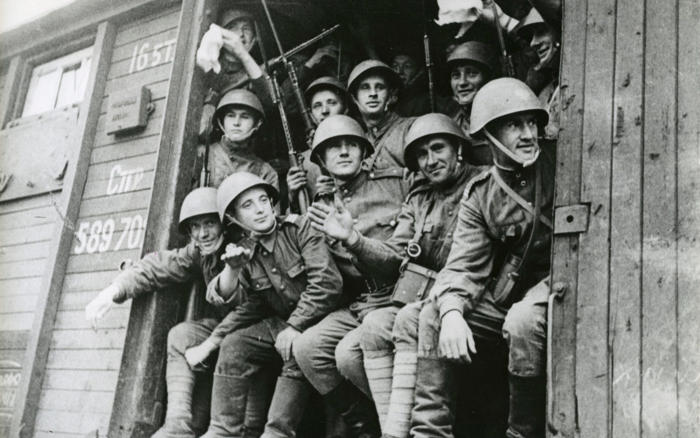
Russian soldiers waving from a train, 1944 - Hulton Archive/Getty Images
To avoid bottlenecks, the quartermasters overseeing these huge movements ran a shuttle service: the trains that transferred men and machines to the front by night returned by day loaded with mocked-up tanks and guns in clear sight of the enemy’s reconnaissance aircraft. Altogether six tank armies were transferred from the Ukraine to the Belorussian Front as well as three armies from the Stavka reserves.
None of these movements were detected by German Intelligence in time to take any avoiding action. No detail was overlooked.
Within 12 days of launching Operation Bagration, the Soviet armies had virtually annihilated Army Group Centre [the German Army groups that fought on the Eastern Front]. A once irresistible force that had stampeded through the Soviet Union in June 1941 to the gates of Moscow was broken, never again to take the offensive. The 9th Army was in tatters; the 4th Army had lost over 80 per cent of its initial strength, down from 165,000 to 35,000 men; the 3rd Panzer Army had lost ten divisions. Altogether, Army Group Centre had lost 25 divisions and more than 300,000 men. The Wehrmacht had never before suffered such a humiliating defeat. But Operation Bagration was not yet over. The seizure of Minsk was merely the end of phase one.
Early in the morning of Monday, July 17, a radio bulletin alerted the Moscow citizenry to the Parade of the Vanquished, which was to wind its way through the streets of the capital a few hours later. Huge crowds began to line the route. At the Hippodrome and the Dynamo football stadium, those POWs deemed strong enough not to collapse en route were formed up in long columns, 25 abreast, before heading out to meet their public, still dressed in their filthy uniforms.
The parade was led by 19 generals, six colonels and more than 1,000 officers of lower rank. Behind them, flanked lightly by Soviet troops, the rank-and-file prisoners, looking to neither left nor right but blankly ahead, were as force-marched trophies of victory. Their faces, etched by exhaustion, showed little emotion: “We did not look around, just marched along, detached, without thinking anything . . . like dead. All was finished . . . We had no thoughts and no feelings,” [junior liaison officer, Josef] Wimmer recalled.
The crowds who lined the pavements, six or more deep, observed this spectacle in near-silence, as though they were indeed witnessing a death march.…[Stalin’s] Moscow Parade, callous as it was, had served its purpose, both boosting his status at home and reminding his allies (and warning his adversaries) that the Red Army was now the Second World War’s most powerful and most successful military force, with which it would be exceedingly unwise to tangle…The all-conquering Red Army, as Churchill so darkly put it, was “spreading across Europe like a tide”.
*According to the US National D-Day Memorial Foundation, the total number of Allied D-Day casualties was approximately 10,000, of whom 4,415 were confirmed dead.
Endgame 1944: How Stalin Won the War by Jonathan Dimbleby (£25) is published on May 23, 2024 by Penguin Viking
Play The Telegraph’s brilliant range of Puzzles - and feel brighter every day. Train your brain and boost your mood with PlusWord, the Mini Crossword, the fearsome Killer Sudoku and even the classic Cryptic Crossword.
